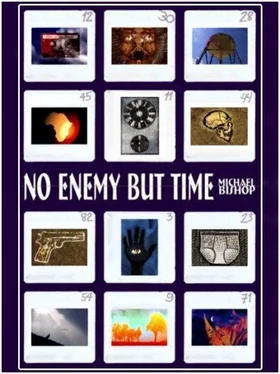“Listen, Kit, why don’t you change places with Jeannette and let me check you out.”
“I don’t want what’s in this basket.”
“Yes, you do,” Bill told her. “You certainly do.”
“I don’t want what’s in the basket and I probably won’t be coming in here again.” She made an elaborate circuit around the other checkout counter and pushed her way through the dingy screen door with the Wonder Bread placard mounted in its upper half.
“Did you see what she did? Did you hear her? God , Daddy, it was unbelievable!”
Bill Rivenbark shook his head, then began ringing up the items in Jeannette’s basket. He usually deducted five percent from the total of each bill, an amount not a great deal larger than the sales tax.
“Daddy, I’m sorry, I really am. Scratch one customer, I guess.”
“Her? Hell, Jeanie, good riddance.”
But his restrained manner, his attention to the prices on the canned goods and packaged meats moving under his hands, made her realize that the possibility of losing Mrs. Givens’s business disturbed him. He did not want it to—he was ashamed that it did—but he could not conceal the fact that he was upset, both by the silly woman’s defection and by his own inability to support his daughter without compromise.
Jeannette was embarrassed for him. Various threats to his livelihood—inflation, new competitors on the outskirts of town—had made a coward of him, or at the very least a tightwad; and this was especially galling when she considered that, to demonstrate her filial loyalty, she had forbidden Hugo to shop at the base commissary, where the food prices, even after her father’s grudging discount, were a great deal less expensive. Maybe the problem wasn’t entirely mercantile. Maybe her father, for the same reason Mrs. Givens had made a fuss about John-John’s hair, found it hard to accept the boy as his grandson.
Appalled, Jeannette grabbed up the groceries Bill Rivenbark had absent-mindedly sacked and broke for the door.
“What’s the matter, Mamma?”
She turned to face Anna. “I don’t know, child. Here. You put the groceries in the stroller while I fetch John-John.” She gave Anna the sack, lifted John-John out of the shopping cart, and, giving her father a wan smile, backed out of the store onto the elevated sidewalk. What was the matter with people? Why were they so frightened of one another? When would it end?
One of the old men on the bench said, “Say, Wesley, you think John-John’s ever gonna get as tall as that nigger over at the state university?”
“What’re you talkin’ about? He ain’t been over there in four or five years, that nigger.”
Jeannette, busy maneuvering the stroller down the steps to the street, glanced over her shoulder at the farmers. “‘What’re you talkin’ about?’ is a helluva good question. Do you senile old coots have any idea what you’re talking about? What you’re really talking about?” She banged the stroller the remainder of the way down and had Anna wedge the groceries into the seat beside John-John.
“Wilt,” said Wesley’s companion. “Wilt the Stilt.”
“Nah,” said Wesley, tugging at his sweat-stained felt hat. “Bill’s grandbaby ain’t ever gonna get that big.
He’s a runt, John-John is, but we might could put him at shortstop for the Dodgers.”
“Call him Pee Wee Monegal.”
“Yeah, he’s already big enough to play for ’em.”
“The Dodgers?”
“Hell, yes, the Dodgers. ‘Bout the right hue, too.”
Delighted with this repartee, the old men laughed together, cackling like crazy people.
“Jesus,” Jeannette said under her breath.
“What’s the matter, Mamma?”
“Nothing. Let’s go home. I’ve got to get supper on.”
Crossing the carrot-colored cobbles of Main Street to the empty stucco carcass of the Pix Theatre, Jeannette looked back and saw her father’s portly silhouette in the grocery’s doorway. He seemed to be a prisoner behind the rusty mesh of the screen.
A Death
But man is a noble animal, splendid in ashes, and pompous in the grave, solemnizing nativities and deaths with equal lustre, nor omitting ceremonies of bravery in the infamy of his nature.
—Sir Thomas Browne
Thenight exploded. I ascended from my dream to find Genly stretched out on the hilltop not more than five or six feet away. My pistol was not in my holster but wrapped about two of the unfortunate habiline’s fingers. I crawled to him in the dark—the moon had long since gone down—and discovered that although he had shot himself through the lungs, he was still conscious, still painfully breathing. His black eyes, tiny pools of ink in a cadaverous face, stared up at me with neither recrimination nor recognition.
As I eased the.45 out of his limp hand, I made a clumsy attempt to read his pulse.
Curiosity killed this cat, I thought.
Another portion of me replied, Curiosity and your own goddamn stupidity, Kampa.
I could have cried. What restrained me was my terror of the Minids, who scrambled from their hovels or crept cautiously toward me from their resting places on the cold hillside. They encircled me and their dying comrade, but did not venture beyond an imaginary barrier about ten feet away. Helen and Emily were the only exceptions to this superstitious timidity. Without waiting to assess the others’ reactions they glided like wraiths to my side and knelt with me over Genly’s prostrate form. Although I expected moans and teeth-gnashing from them, their behavior, despite their bewilderment, was exemplary, low-keyed and seemly—as if they understood that an unrestrained outpouring of grief or rage would further traumatize the dying male.
At last, when Emily put her lips to her husband’s furrowed forehead, I did cry. The habilines apparently had no tears—not for emotions, anyway—and their dry-eyed faces ringing us about seemed a shadow-gallery of gargoyles and carven masks. I was a stranger here. Then the faithless lady lifted Genly’s hand and with a kind of reminiscent tenderness held it between her thighs. Genly shifted his gaze, and a froth of blood bubbled at the corner of his mouth.
“Genly, Genly, I’m sorry—”
I do not remember all that went through my mind then or shortly afterwards, but my foremost thought was that Genly was suffering. I ought to put the.45 to his temple and pull the trigger.
Technologically disadvantaged, the Minids did not understand the mechanical operation of firearms. Few of them, however, doubted that my automatic was a potent death-dealer. Even Genly in his curiosity and presumption had understood that much; he had simply not counted on dealing that fatal card to himself.
So when I raised the Colt to his head, the Minids grunted their disapproval even as they cowered away into the darkness.
Beside me, Emily put one lank, hairy arm around her husband’s head, while Helen, angry, made insistent chattering noises and jostled my gun hand. I engaged the pistol’s safety and backed away.
“He can’t recover, Helen. There’s no way Genly’s ever going to be well again. You’ve got to let me ease him along, ladies. All I want to do is ease him along.”
Helen ceased chattering and stared at me. Under the implications of that stare, I withered. Shot down by an Eolithic princess who popped the heads of tree mice between her fingers and performed most of her excretory functions in public. Even though I believed then, and still believe today, that Genly deserved the merciful blitz of a bullet to the brain, I withered. Emily and Helen were holding out for life when the choice was not between life and death, but between a quick death and a needlessly protracted one.
Читать дальше



![Ally Carter - [Gallagher Girls 01] I'd Tell You I Love You But Then I'd Have to Kill You](/books/262179/ally-carter-gallagher-girls-01-i-d-tell-you-i-lo-thumb.webp)








